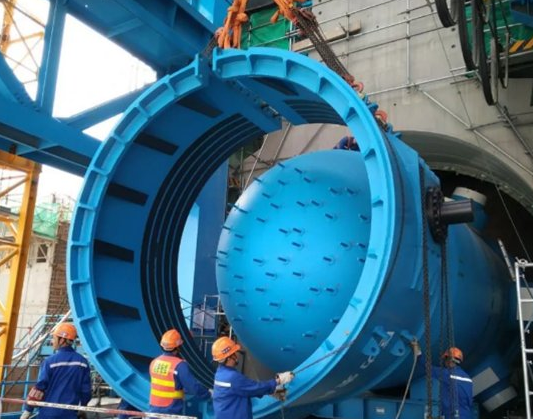Research status and prospect of comprehensive utilization of nuclear energy
1. Current situation and advantages of nuclear energy utilization at home and abroad
1.1 Current situation at home and abroad
Nuclear energy is one of the important pillars to meet the energy supply and ensure national security. In the global total power generation, the proportion of nuclear power generation is 10.4%. As of March 2019, there are 449 commercial nuclear power reactors in operation in 30 countries, with a total installed capacity of 396 GW, 55 nuclear power units under construction, and 57 GW of nuclear power units under construction [1, 2]. In addition, there are about 240 research reactors in operation in 56 countries, and 180 power reactors provide power for about 140 ships and submarines.
Nuclear power generation has great advantages in terms of technological maturity, economy and sustainability. At the same time, compared with hydropower, photoelectric and wind power, nuclear power generation has the advantages of no intermittenity and less constraint by natural conditions. It is a clean energy that can replace fossil energy on a large scale. According to the statistics of China Nuclear Energy Industry Association, as of December 31, 2018, 44 nuclear power units were put into commercial operation in China (excluding Taiwan), with a total installed capacity of 44.6GW, and 11 nuclear power units were under construction, with a total installed capacity of 11GW. From January to December 2018, the cumulative power generation of nuclear power units in China was 286.511 billion KWH, accounting for 4.22% of the total power generation. The average utilization hours of nuclear power equipment are 7 499.22 hours, and the average utilization rate of equipment is 85.61%[3]. Compared with coal-fired power generation, nuclear power generation is equivalent to reducing the burning of standard coal by 76.468 million tons, reducing the emission of carbon dioxide by 203.346 million tons, reducing the emission of sulfur dioxide by 655,000 tons, and reducing the emission of nitrogen oxides by 566,000 tons.

The efficient development of nuclear power on the basis of ensuring safety is an important policy of China's energy construction at present, which is of great significance to ensure energy supply and security, protect the environment and achieve sustainable development. In the 13th Five-Year Plan for Energy Development, the National Development and Reform Commission and the National Energy Administration have defined the path and key tasks of China's energy development during the 13th Five-Year Plan period, and proposed to strive to build a clean, low-carbon, safe and efficient modern energy system. The National Development and Reform Commission and the National Energy Administration's "Energy Technology Revolution and Innovation Action Plan (2016-2030)" also clearly stated that China will continue to deeply implement the innovation-driven development strategy, improve the scientific and technological research and development system in the field of nuclear energy, and support scientific research in the fields of small modular reactors, fourth-generation nuclear energy systems, and nuclear energy hydrogen production. Let nuclear energy contribute more to the building of a "beautiful China".
1.2 Advantages
From the point of view of energy efficiency, the direct use of heat is a more desirable way, and electricity generation is only one form of nuclear energy utilization. With the development of technology, especially the gradual maturity and application of the fourth-generation nuclear energy system technology, nuclear energy is expected to play a huge role in ensuring the sustainable development of global energy and water security through non-electric applications such as nuclear hydrogen production, high-temperature process heat, nuclear heating, seawater desalination and other comprehensive utilization forms [4].
Nuclear hydrogen production has many advantages over fossil fuel hydrogen production, in addition to reducing carbon emissions, because fourth-generation nuclear reactors can provide higher output temperatures, the production of hydrogen energy consumption is also less. At present, about 20% of energy consumption is used for process heat applications, and the development of high temperature process heat in metallurgical, heavy oil thermal recovery, coal liquefaction and other application markets will greatly affect the development of nuclear energy. Replacing fossil fuel heating with nuclear heat has huge advantages in ensuring energy security, reducing carbon emissions, and price stability, and is also an important option. At present, the global demand for drinking water is growing, and nuclear energy for desalination has proved to be a viable option to meet this demand, which offers hope for regions lacking fresh water. Nuclear desalination can also be used for effective water management at nuclear power plants, providing regular water supply at all stages of operation and maintenance.
2 Fourth generation advanced nuclear energy system
2.1 Characteristics and international research status of the fourth generation of advanced nuclear energy systems
- ABB
- General Electric
- EMERSON
- Honeywell
- HIMA
- ALSTOM
- Rolls-Royce
- MOTOROLA
- Rockwell
- Siemens
- Woodward
- YOKOGAWA
- FOXBORO
- KOLLMORGEN
- MOOG
- KB
- YAMAHA
- BENDER
- TEKTRONIX
- Westinghouse
- AMAT
- AB
- XYCOM
- Yaskawa
- B&R
- Schneider
- Kongsberg
- NI
- WATLOW
- ProSoft
- SEW
- ADVANCED
- Reliance
- TRICONEX
- METSO
- MAN
- Advantest
- STUDER
- KONGSBERG
- DANAHER MOTION
- Bently
- Galil
- EATON
- MOLEX
- DEIF
- B&W
- ZYGO
- Aerotech
- DANFOSS
- Beijer
- Moxa
- Rexroth
- Johnson
- WAGO
- TOSHIBA
- BMCM
- SMC
- HITACHI
- HIRSCHMANN
- Application field
- XP POWER
- CTI
- TRICON
- STOBER
- Thinklogical
- Horner Automation
- Meggitt
- Fanuc
- Baldor
- SHINKAWA
- Other Brands




































































































































